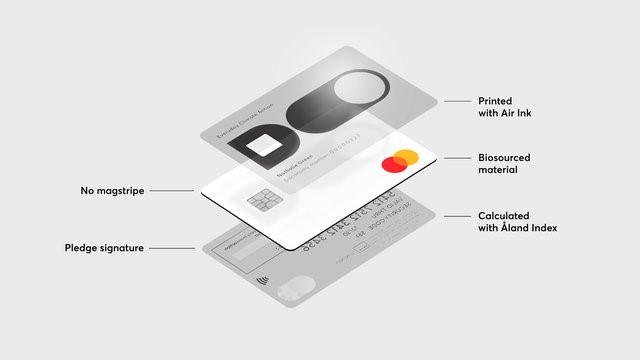Mastercard and Doconomy Help Customers Track their Carbon Footprint

FACTS
- The American card scheme Mastercard teams up with the Swedish start-up Doconomy on enabling their cardholders to track the carbon footprint for each of their purchases.
- Goal: help users become aware of how impacting their expenses are on the climate.
- In addition to expanding their partnership, Mastercard also announced an investment in Doconomy’s capital.
- Mastercard cardholders will be able to track and assess the CO2 emissions induced by their purchases using a dedicated mobile app.
- Doconomy was established in 2018. Their solution has been awarded on several occasions. They have also been named a partner on climate change to the United Nations Framework Convention on Climate Change (UNFCCC).
- How it works. Doconomy relies on the Åland Index, launched by The Bank of Åland, to track CO2 emissions for each transaction. They link each category of transaction to its impact on the planet and provide a reference climate index. Doconomy also teamed up with Trucost, acquired by S&P Global’s rating department to better analyse this data.
- Bank of the West –US-based subsidiary of the French group BNP Paribas– and Nordea will be the first banks to feature this tracking option for their customers through their mobile apps.
CHALLENGES
- The challenge of eco-consciousness. According to a report by Payments Europe, 76% of the European customers deem that payment cards are the best payment method. However, the issue of environmental consciousness becomes a critical topic. According to the ECB, there were roughly 831.3 million cards in Europe in 2018. And, from time to time, they have to be replaced.
- Through this initiative, Mastercard isn’t trying to reconsider the environmental impact of payment cards, but provides customers with an overview of the carbon footprint induced by their purchases by way of increasing environmental awareness. The card scheme says that many people would be ready to get involved in fighting climate change but have no idea how to contribute.
MARKET PERSPECTIVE
- In February 2019, the Swedish FinTech announced a partnership with Mastercard on launching a payment card enabling customers to set limits based on their CO2 emissions, and make purchases depending on this index.
- More eco-conscious launches have been announced. The Dutch neo-bank, Bunq, recently unveiled an environmentally conscious card helping customers compensate their carbon footprint as they make card payments.
- Mastercard and Nordea also worked with the Finnish FinTech Enfuce which just introduced My Carbon Action, providing banking customers with assessments of the carbon footprint induced by their purchases and improving their environmental footprint.
